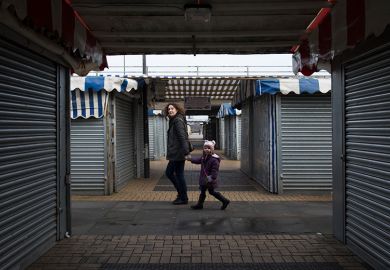The economic impact of Covid-19 on European universities will be felt for “over a decade”, a policy expert has warned, as new data reveal how different higher education funding sources are expected to be strained by the pandemic.
Figures from the European University Association (EUA), based on a survey of 28 national rectors’ conferences during the summer, reveal that half of university systems are predicting a drop in international student fees between now and 2021-2023, while 39 per cent are expecting a drop in contractual research funding.
Almost half (46 per cent) of respondents said that they expected tuition fees from domestic or European students to remain stable, while 18 per cent anticipated a decline.
Thomas Estermann, director for governance, funding and public policy development at the EUA, said that a decline in funding from contractual research will “increase the competition for competitive funding for research” and result in grant application “success rates going down massively”.
However, the data, which is part of the EUA’s annual Public Funding Observatory, also reveal the high levels of uncertainty within the sector, with 54 per cent of respondents saying that they did not know how philanthropic funding levels would be affected in the next three years.
While 10 systems predicted that core national public funding to universities would remain stable, seven predicted a decline and eight said that they did not know what to expect. Similarly, 12 systems said that they expected competitive national funding for higher education to be stable, while four predicted a drop and seven did not know.
When asked about the income sources that had so far been impacted by the Covid-19 pandemic, 21 respondents cited services, such as housing or retail, while 16 highlighted contractual research and 12 mentioned tuition fees from international students, which vary widely across Europe.
Meanwhile, digital infrastructure was flagged as a new area of investment following Covid-19 by 25 university systems and staff training was cited by 16 respondents. Six systems said that they expected to invest in physical infrastructure.
Mr Estermann said that the findings show there are “great concerns about the funding situation in the future”, even among systems that were well-funded before the pandemic.
At the same time, there are “strong investment needs” as a result of the Covid-19 crisis and it will be “challenging and difficult to take away investment from other areas”, he said.
Mr Estermann added that EUA data collected since the 2008 financial crisis suggest that the economic impact of Covid-19 on European universities will “last for a period of 10 years” but “play out differently in different systems”.
“The effects will certainly be felt for over a decade, that’s very clear,” he said. “Already now, the economic recession is more challenging in comparison to the 2008 [crash].”
Register to continue
Why register?
- Registration is free and only takes a moment
- Once registered, you can read 3 articles a month
- Sign up for our newsletter
Subscribe
Or subscribe for unlimited access to:
- Unlimited access to news, views, insights & reviews
- Digital editions
- Digital access to THE’s university and college rankings analysis
Already registered or a current subscriber?







